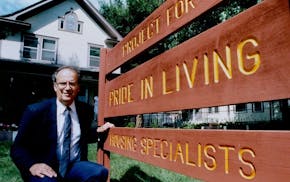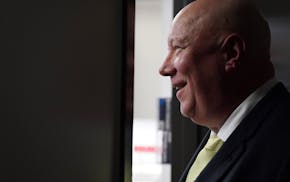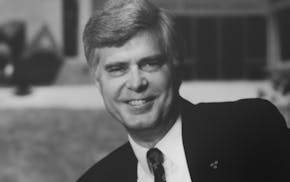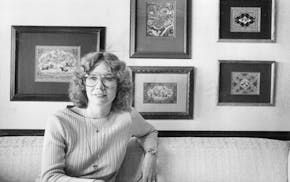Bruce Coppock, the former St. Paul Chamber Orchestra president and managing director who had revolutionary ideas about orchestra leadership, has died. He was 71.
In 2004, the SPCO abandoned the conventional model of having a single music director. Instead, orchestra musicians became the leadership, collaborating with a team of artistic partners that have included violinist Joshua Bell and conductor Nicholas McGegan. It was a revolutionary idea in the classical music world. And Coppock ushered it into being.
He died Monday after living with a rare form of bile duct cancer for 16 years. He had been living in the Boston area of his youth since retiring from the SPCO in 2016.
Coppock served as the orchestra's chief executive officer from 1999 to 2008, then returned to the role after a management lockout of musicians canceled most of the SPCO's 2012-13 season.
"It is no exaggeration to say that no single person had a greater role in the SPCO's artistic trajectory over the last 20 years than Bruce Coppock," SPCO artistic director and principal violin Kyu-Young Kim said. "His fervent belief that the SPCO's ultimate success as a chamber orchestra was dependent on the SPCO musicians themselves rather than a single conductor led to a complete transformation of the ensemble."
That wasn't the only significant change that happened under Coppock's leadership. When he joined the SPCO, he stressed that the orchestra would be better served by a more intimate, acoustically sensitive venue than St. Paul's Ordway Music Theater. In 2015, a 1,100-seat space, the widely praised Ordway Concert Hall, opened and has been the orchestra's home since.
Soon after it opened, the SPCO recorded an album built around Franz Schubert's "Death and the Maiden" there with violinist and artistic partner Patricia Kopatchinskaja. That album went on to win the Grammy for best chamber music/small ensemble performance in 2018.
"Bruce's impact on the SPCO was profound and enduring," said Lowell Noteboom, former board chair for both the SPCO and the League of American Orchestras. "His creative energy was a force to be reckoned with. His standards were so high; his expectations for himself and for the rest of us were daunting. It required us to stretch and change. And we did."
The SPCO's current president and managing director, Jon Limbacher, agreed.
"He instilled in the organization a willingness to challenge the orthodoxy of the orchestra field," Limbacher said. "His leadership philosophy was clear and simple: Be bold and be not afraid. And this philosophy is deeply ingrained in the SPCO's DNA."
Coppock began his musical career as a cellist. In the classical music hotbed of Boston, he co-founded the Boston Chamber Music Society in 1982 and also played cello with the Handel and Haydn Society and, frequently, with the Boston Symphony Orchestra.
In 1989, a severe hand injury inspired Coppock to set aside his cello and move into orchestra management. Within three years, he was executive director of the St. Louis Symphony Orchestra before joining the SPCO in 1999. He also held positions with New York's Carnegie Hall, the Cleveland Orchestra in Miami and the League of American Orchestras.
Coppock's leadership skills also came into play in trying to help those who had the same cancer he endured: He served as vice chair of the board of the Cholangiocarcinoma Foundation.
He is survived by his wife Lucia P. May, four children and five grandchildren. Limbacher said the SPCO is planning to formally honor Coppock in the coming months.
Rob Hubbard is a Twin Cities classical music writer. Reach him at wordhub@yahoo.com.

Joe Selvaggio, social change agent who started Project for Pride in Living, dies at 87
Bemidji State University women's volleyball coach dies of cancer at age 41

Former Minnesota veterans commissioner, who resigned after ALS diagnosis, dies at 61

Axel Steuer, who guided Gustavus Adolphus College through 1998 tornado, dies at 81

